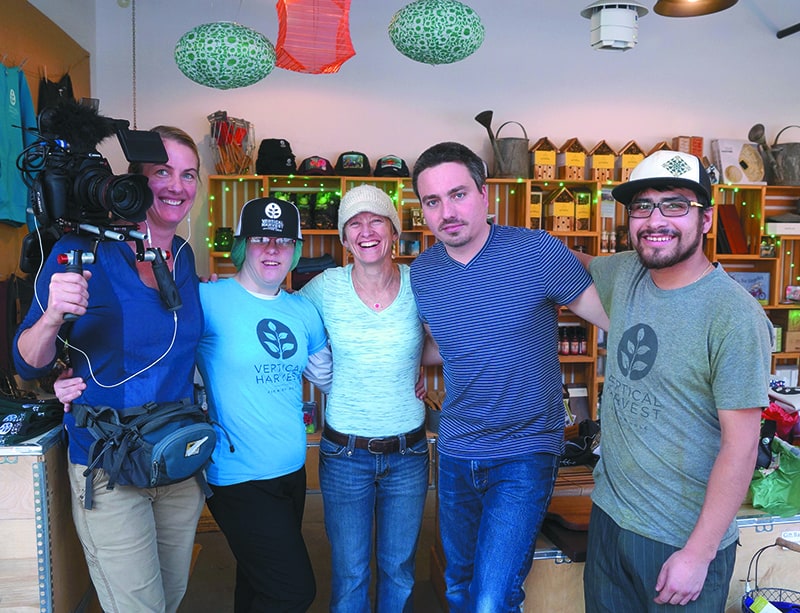Read The
Current Issue
Hearts of Glass
A new feature-length film shows why Jackson’s Vertical Harvest might be the country’s most interesting and innovative greenhouse.
By Julie Kukral

Director/producer Jennifer Tennican, center, with, from left, co-director of photography Melinda Binks, Vertical Harvest employee Amy Linn, co-director of photography Blake Ciulla, and Vertical Harvest employee Azeal Zarate. Courtesy Photo
A GREENHOUSE MAY not sound like the most compelling subject for a documentary film, but Vertical Harvest is not your usual greenhouse. It is attached to the side of a city-owned parking garage and sits on just one-tenth of an acre of land, at an elevation of 6,237 feet. And then there’s the whole reason Nona Yehia and Penny McBride founded it: to provide meaningful employment for Jackson Hole men and women with intellectual and physical disabilities. Over half of Vertical Harvest’s 35-person full-time staff have a disability.
Jackson-based documentary filmmaker Jennifer Tennican tells the story of Vertical Harvest’s first 15 months of operation (the first seeds were planted in the spring of 2016) in her newest film, Hearts of Glass. Produced with help from Slow Food in the Tetons, the film was finished in 2018 and premiered at California’s Wild & Scenic Film Festival in January 2019. In the movie, which shares the personal and professional lives of Vertical Harvest employees, “You see so many interconnected threads around social entrepreneurship, sustainable local food production, employment, and inclusion,” says Tennican, who has seen the film resonate with a diverse group of audiences at film festivals including the Colorado Environmental Film Festival, American Documentary Film Festival, ReelAbilities Film Festival: New York, Princeton Environmental Film Festival, Ashland Independent Film Festival, Julien Dubuque International Film Festival, and Black Hills Film Festival. “It’s not this two-dimensional caricature of people with disabilities that we typically see in films.”
Johnny Fifles is a 29-year-old jack-of-all-trades employee who is passionate about politics, social justice, and My Little Pony. Fifles earned a B.A. in Fine Arts from the University of Wyoming and pre-Vertical Harvest worked at a hotel helping with cleaning. At Vertical Harvest, he works in the market, does guided tours for the public (go to verticalharvestjackson.com to see the tour schedule and book a tour), and helps on the microgreen floor. The title that captures this wide-ranging position? “Rainbow Dash,” after one of Fifles’ favorite My Little Pony characters. Vertical Harvest wants its employees to be in jobs that showcase their strengths, so positions are often as unique as the people holding them. Mycha Miller started in the greenhouse’s retail space, but transitioned to packaging and processing, and ultimately to spending more time working on her independent art business, where she can be her own boss. Tennican says the fact that Vertical Harvest is shattering glass ceilings for people with disabilities helped her decide on the film’s name. “It’s this incredible metaphor,” she says. “It’s a barrier, but you can see through it and it’s transparent.”
Hearts of Glass will be on the festival circuit through the end of the summer. After that the film will be the centerpiece of a grassroots outreach and engagement campaign with screenings across the nation. To find a screening near you, or to bring it to your town, visit HeartsOfGlassFilm.com.




